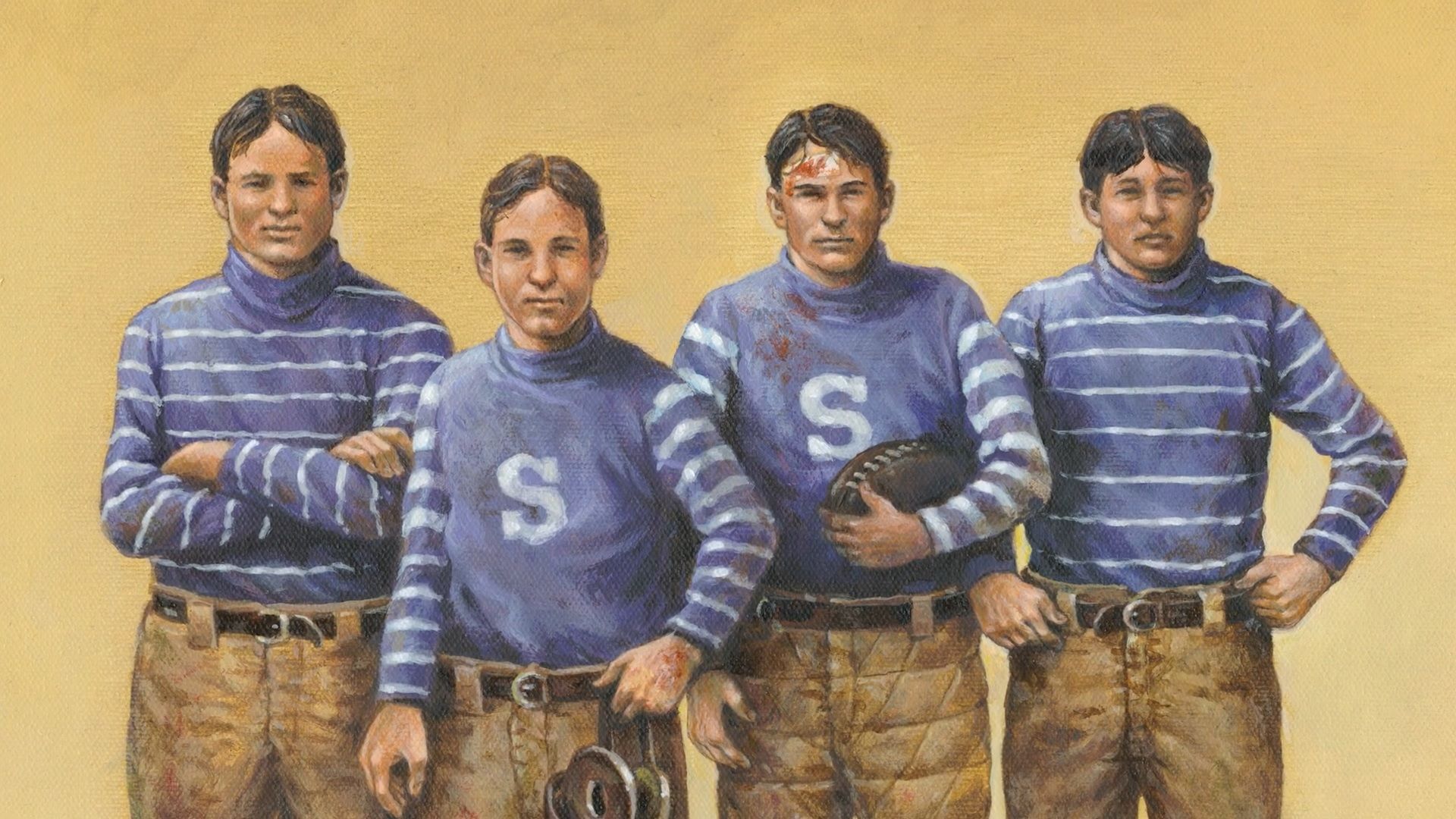Life can seem tough for college football players these days. They’re playing almost every Saturday, sometimes after long plane rides.
But now imagine the guys at the University of the South, better known as Sewanee. (Shown here is a painting of the backfield.) Their story is told in “Unrivaled: Sewanee 1899” on PBS World (7 p.m. Saturday, Sept. 16) and then on pbs.org.
In 1899, the team’s manager, a student, booked a game with Texas. Still, that wouldn’t make enough money to pay for the 1,000-mile train ride from the Cumberland Plateau, near Nashville, to Austin.
His solution? On the way back, they would play four more games against top schools. That’s five games in six days, plus 2,500 miles on the train.Sewanee won each game, with a combined score of 91-0. The full season was 12-0, with a combined 322-10. In 2010, the College Football Hall of Fame voted it the best team ever.
None of this fits our image of a modern powerhouse. The players (averaging 169 pounds) didn’t have athletic scholarships; one was the valedictorian.
They had little protection, other than a thin helmet with no facemask. Some opponents skipped the helmets. One team had leather loops on the back of their pants, so they could grab each other and form a chain; Sewanee made the referees cut the loops off.
It was no-nonsense football – no passing, lots of quick-kicks, sometimes on first down. Players stayed on the field for offense and defense; if they left the game, they couldn’t return.
The film tells this in two versions – one-hour (on the air Sept. 16) and 90 minutes (also at pbs.org) – with a few re-enactments, many photos and lots of talking heads.
Those vary widely. Nick Saban, the Alabama coach, seems to be reading prepared comments; Jon Meacham, the Pulitzer Prize-winning historian, is relaxed as always, with insightful comments.
Yes, Meacham is a Sewanee grad. This little school – 1,700 students, plus a small Episcopal seminary – is known these days for academics.
In 1940, it dropped out of big-time football and soon helped found what’s called Division III, with no athletic scholarships. It last tied for a conference championship in 2000 and won one outright in 1992.
But its people have done big things, which the film (at least the 60-minute version) doesn’t mention.
That student manager who planned the ultimate road trip? Luke Lea went on to be founder and editor of the Nashville Tennesseean, a one-term U.S. senator and a banker swallowed up by the Depression.
In World War I, he started and led a private artillery unit. The Army praised him for his work in France … and chastised him for his unauthorized attempt to kidnap Kaiser Wilhelm II. It was a different era.

Now THAT was quite a football road trip
Life can seem tough for college football players these days. They’re playing almost every Saturday, sometimes after long plane rides.
But now imagine the guys at the University of the South, better known as Sewanee. (Shown here is a painting of the backfield.) Their story is told in “Unrivaled: Sewanee 1899” on PBS World (7 p.m. Saturday, Sept. 16) and then on pbs.org.
In 1899, the team’s manager, a student, booked a game with Texas. Still, that wouldn’t make enough money to pay for the 1,000-mile train ride from the Cumberland Plateau, near Nashville, to Austin.
His solution? On the way back, they would play four more games against top schools. That’s five games in six days, plus 2,500 miles on the train.Sewanee won each game, with a combined score of 91-0. The full season was 12-0, with a combined 322-10. In 2010, the College Football Hall of Fame voted it the best team ever. Read more…